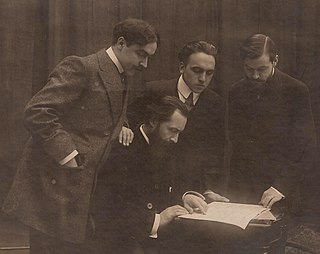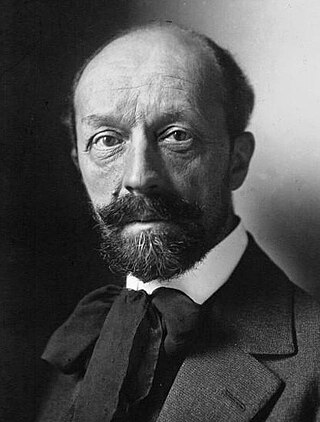Related Research Articles

The term string quartet refers to either a type of musical composition or a group of four people who play them. Many composers from the mid-18th century onwards wrote string quartets. The associated musical ensemble consists of two violinists, a violist, and a cellist. The double bass is almost never used in the ensemble mainly because it would sound too loud and heavy.
The Takács Quartet is a string quartet founded in Budapest, Hungary, and now based in Boulder, Colorado, United States.

The Lindsay String Quartet was a British string quartet from 1965 to 2005.

Robert Marcel Casadesus was a renowned 20th-century French pianist and composer. He was the most prominent member of a distinguished musical family, being the nephew of Henri Casadesus and Marius Casadesus, husband of Gaby Casadesus, and father of Jean Casadesus.

The Melos Quartet was a much-recorded, Stuttgart-based string quartet active from 1965 until 2005, when its first violinist died. It also went by the name Melos Quartett Stuttgart, partly to distinguish itself from the equally prominent chamber group the Melos Ensemble of London.

Karl Ristenpart was a German conductor.

The Fine Arts Quartet is a chamber music ensemble founded in Chicago, United States in 1946 by Leonard Sorkin and George Sopkin. The Quartet has recorded over 200 works and has toured internationally for 77 years, making it one of the longest enduring major string quartets. In its history, the Quartet has had two leaders: Leonard Sorkin, from 1946 to 1981, and Ralph Evans, from 1982 to the present. Its current members are violinists Ralph Evans and Efim Boico, violist Gil Sharon, and cellist Niklas Schmidt.

The Capet String Quartet was a French musical ensemble founded in 1893, which remained in existence until 1928 or later. It made a number of recordings and was considered one of the leading string quartets of its time.
The Hungarian String Quartet was a musical ensemble of world renown, particularly famous for its performances of quartets by Beethoven and Bartók. The quartet was founded in Budapest in 1935 and was disbanded in 1972.
The Végh Quartet was a Hungarian string quartet founded in 1940 and led by its first violinist Sándor Végh for 40 years. The quartet was based in Budapest until it departed Hungary in 1946. It is particularly known for its recordings of the Beethoven and Bartók cycles. The quartet disbanded in 1980.
The Tátrai Quartet was a Hungarian classical string quartet founded in 1946. For the half-century after World War II it was one of the foremost string quartets in Hungary, specializing in Haydn and Bartók, whose complete quartets it recorded for Hungaroton, Mozart and Beethoven as well, and were also responsible for first performances of works by certain Hungarian composers.
Serge Collot was a French violist and music educator.

Charles Eugène Sauzay was a French violinist and composer.
Bernard Zaslav was an American viola soloist and chamber musician with an extensive recording and performance career. A founding member of The Composers Quartet in 1965, he went on to play with the Fine Arts Quartet, Vermeer Quartet, and the Stanford String Quartet. He has also performed and recorded as the Zaslav Duo with his wife, pianist Naomi Zaslav.
Alfred Loewenguth was a 20th-century French classical violinist.
Jean-Louis Haguenauer is a French classical pianist.
Maurice Hewitt was a French violinist and conductor, as well as a member of the French Resistance during World War II.
Françoise Doreau, was a French classical pianist.
The Ludwig Quartet is a French string quartet ensemble founded in 1985 and leading an international career. It is composed of Sébastien Surel, Manuel Doutrelant, Violaine Despeyroux (viola) and Anne Copéry (violoncello).

Sinfonietta, Op. 52, is a small symphony for string orchestra by Albert Roussel composed in 1934. It was premiered on 19 November 1934 by the Orchestre féminin de Paris, conducted by Jane Evrard. It was written at the same time as his fourth symphony. The first movement is in sonata form.
References
- ↑ Albert Richard, 'Alfred Loewenguth: 70 Ans-50 Ans d'Activité,' La Revue Musicale no. 347 (1981), 48 pages.
- ↑ Alfred Loewenguth, 'Reflexions sur la Musique de Chambre en général et sur le Quatuor á cordes en particulier', in Rüdiger Görner (Ed.), Logos Musicae: Festschrift für Albert Palm (Franz Stein Verlag, Wiesbaden 1982), p.131-32.
- ↑ Sleevenote, Loewenguth Quartet: Haydn Quartets op 74 no 3 & op 76 no 2,(Oriole LP SMG 20066), issued 1963.
- 1 2 3 Performer in the early 1950s Deutsche Grammophon recordings.
- ↑ Martini is also known as the conductor of the Concerts Colonne.
- ↑ Jacques was father of the composer Ida Gotkovsky, see .
- ↑ Active 1972 in live Mozart recordings.
- ↑ Borsarello biographical notices
- ↑ See short history of the quartet on the Doremi reissue prospectus of Loewenguth recordings:
- ↑ Jonathan Woolf review of the Loewenguth Quartet on Musicweb International
- ↑
- ↑ Festival de l'Orangerie de Sceaux
- ↑ Photos: Loewenguth Quartet tours of Southern Africa 1955, 56, 64
- ↑ 'Quartet begins concerts series', New York Times Sunday 14 November 1948.
- ↑ Rob Barnett, 'Review, Egon Wellesz String Quartets (Nimbus)', Music Web International.
- ↑ The Canadian Encyclopedia: 'Casavant Society': #Montreal.
- ↑ Schott's Music - Rainier profile
- ↑ See title listings in Library of Congress Catalogue online.
- ↑ Review by Richard F. Goldman, Musical Quarterly XXXIX (2)(1953), p.338-39.